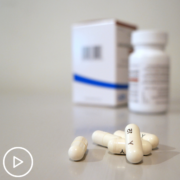The Truth About Myeloma Treatment Side Effects
The Truth About Myeloma Treatment Side Effects from Patient Empowerment Network on Vimeo.
Managing myeloma treatment side effects can be overwhelming. Dr. Irene Ghobrial reviews common side effects and shares how life can go on, even while undergoing treatment for myeloma. Download the Program Resource Guide, here.
Dr. Irene Ghobrial is Director of the Clinical Investigator Research Program at Dana-Farber Cancer Institute and Professor of Medicine at Harvard Medical School. Dr. Ghobrial specializes in multiple myeloma (MM) and Waldenström macroglobulinemia (WM), focusing on the precursor conditions of monoclonal gammopathy of undetermined significance (MGUS) and smoldering myeloma. More about this expert here.
See More From Fact of Fiction? Myeloma
Related Resources

|

Hesitant to Join a Support Group? Encouraging Advice from an Advocate |
Transcript:
Patricia:
What are the common myeloma misconceptions about treatment side effects?
Dr. Ghobrial:
I think the biggest thing is the loss of hair, the nausea, and fatigue, and to the point that I cannot travel, I cannot see my family, I’m gonna be so immunosuppressed. And again, that’s a huge misconception. Yes, there is toxicity for every drug. Even if you take aspirin, you have toxicity from it.
But, every drug has risks and benefits, and currently, the combinations we have are just impressive that they are well tolerated in general. I’m not saying there is no side effect – there is, for every different class of agents, there are, and you will go through those side effects with your doctor in detail – but in general, yes, you’re slightly immunosuppressed, you have to take care of it, and I said it yesterday to one of my patients – if someone is looking very sick in front of you, don’t go and hug them.
Christmas is around the corner, and we want to make sure people celebrate and enjoy life and enjoy the holidays with their family members.
Patricia:
Dr. Ghobrial, let’s talk about some of the things that patients are concerned about when they come in about treatment side effects, and maybe some of those things aren’t true. You tell me. Treatment side effects are unavoidable – we already talked a little bit about that. How about this one? “Myeloma patients should visit the dentist more frequently.”
Dr. Ghobrial:
So, there is something about the bisphosphonates that we give patients, and they can cause – in a very rare number of patients – something called osteonecrosis of the jaw.
In the old days, when we didn’t know about that side effect, people would go get a root canal, come back, and have a big problem of osteonecrosis of the jaw with severe pain, and it doesn’t recover.
So, we’ve learned our lesson. We know very well that we hold Zometa or zoledronic acid if they’re getting any procedures. We make sure they don’t get surgical procedures – it doesn’t mean don’t get dental cleaning, please do the usual things for dental health, but don’t go into surgical procedures when you’re getting zoledronic acid – and we’re very careful with that.
We talk to our patients. Most dentists know about it, so I think this is something that in the old days, it was a problem. Now, we know how to medicate that.
Patricia:
Sure. How about this one? “Treatment causes increased risk for blood clots.”
Dr. Ghobrial:
So, a couple of the drugs that we have – especially immunomodulators – can increase your risk for DVTs, blood clots, or pulmonary embolism, PE. So, the first thing we say is, “Let’s assess your baseline risk.
Are you someone who is at risk of clotting anyways?” Remember, myeloma also increases your risk of clotting, so you’re double. So, if you are at a high risk of clotting, then we would give the full anticoagulation. If you are not, then we would say aspirin is good enough to control that inflammation and endothelial damage that happens early on with therapy, and that can take care of it.
Patricia:
How about this one? “Side effects can be managed by diet and lifestyle.”
Dr. Ghobrial:
So, I am a big believer that exercise and good, healthy living helps you in general. It makes your mood better, it makes you feel stronger, it gives you that energy because of the fatigue from the side effects, it helps with the dexamethasone because dex is a steroid, so you’re gonna be hungry, you’re gonna be eating more, and the on-and-off makes you fatigued and tired.
So, absolutely, diet and good healthy living – I’m not saying you have to go into extreme starvation and things like that. We say in general, be good, healthy living; exercise if you can.
Patricia:
What do you hear from your patients about side effects and treatments that they may think is true?
Dr. Ghobrial:
I think neuropathy is very important, and we underestimate the neuropathy, so if you have numbness or tingling, tell your doctor.
That comes from Velcade; it comes from thalidomide when we used to use thalidomide, but it can happen in many patients who have an underlying amyloidosis and we did not diagnose it yet, or it can just happen as you go on from myeloma, rarely. So, tell your doctor about this.
I think the fatigue is very important to know about it because people suddenly change their life, and they want to know about that. I think the rashes that can happen with many of the drugs are very important to know about so that you’re not surprised when you get the rash. We know, for example, Revlimid can cause itching of the scalp, and that’s something that if we don’t tell the patients and they start going like this, then there is a problem.
So, it’s small things, but we want to let them know. We usually tell the patients everything, to a point of just going through all the side effects. It’s better to be aware of it, and then, if you get or not, at least you were aware.
Patricia:
Sure. How does one distinguish treatment side effects from comorbidities like fatigue?
Dr. Ghobrial:
I think that’s important, and again, talking to your doctor is very important. Keeping a diary on the side is very important because you may have had some of those problems, and that could be from myeloma before you even started the drugs, and making sure that we know what’s from myeloma, what’s from your thyroid issue, what’s from your lung problems if you have asthma or COPD, what’s your diabetes if you have that or your other medications, from what are you doing with those medications.
I think that’s why when you start therapy, we tell you, “Try not to take too many other medications that we don’t know about, herbal medicines and other things, because then we don’t know what are the side effects and what’s causing what.”
Patricia:
Sure. You mentioned neuropathy. Let’s talk a little bit about what that is.
Dr. Ghobrial:
So, neuropathy can come in different ways, but the most common one is numbness and tingling that you have in your tips of toes and tips of your fingers, and that can happen from medications, as we said, or from the underlying myeloma or amyloidosis. It can be painful, and we’re careful that if you have this, tell your doctor because if it get worse and worse, it’s very hard for us to reverse neuropathy, so just always tell us because we can stop the drug, we can decrease the dose rather than having you go through it.











